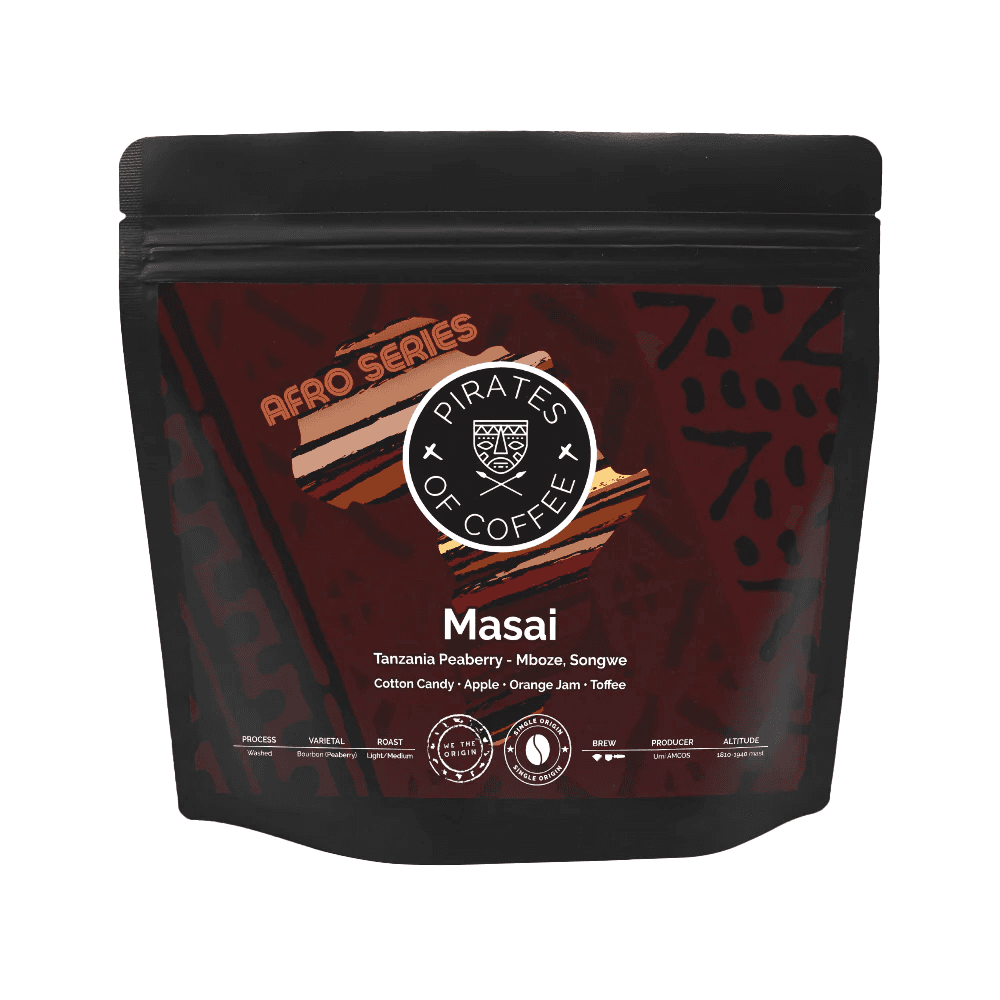Th3rdwave Directories
Cafés
Roasters
Coffees
Guides
Awards
Th3rdwave Coffee Club
Subscription
Gift subscription
Current edition
Past editions
Shop
Advent Calendar
Coffee games
Th3rdwave Wallet
Loyalty cards
Gift cards
Th3rdwave for cafés
Th3rdwave for roasters
Get free coffee
Masai
Songwe is one of Tanzania’s administrative regions and borders the countries of Zambia & Malawi to the south. The region is well known for producing food crops and is one of the best regions for maize, sorghum and potato cultivation.
This coffee is sourced from various farmers of the Umi AMCOS farmers’ group in Mbozi, Songwe. Representing the local smallholder producers that deliver fresh cherries during the harvest season, Umi was created in 2014 and produces fully washed coffees. Farmers deliver ripe cherries in the afternoons and the cherries are processed that evening. After depulping, the coffee is graded using channels and then fermented for an average period of 18-36 hours before it is washed. After this, the coffee is soaked for an average of 8-12 hours and then placed on raised beds for an average of 8-14 days to complete the drying process, where it is moved consistently to ensure a uniform dryness throughout the lot. The leftover pulp is available for smallholders to bring back to their farms to use as fertilizer.
The resulting cup reminds us of cotton candy, apple & orange.
This coffee is sourced from various farmers of the Umi AMCOS farmers’ group in Mbozi, Songwe. Representing the local smallholder producers that deliver fresh cherries during the harvest season, Umi was created in 2014 and produces fully washed coffees. Farmers deliver ripe cherries in the afternoons and the cherries are processed that evening. After depulping, the coffee is graded using channels and then fermented for an average period of 18-36 hours before it is washed. After this, the coffee is soaked for an average of 8-12 hours and then placed on raised beds for an average of 8-14 days to complete the drying process, where it is moved consistently to ensure a uniform dryness throughout the lot. The leftover pulp is available for smallholders to bring back to their farms to use as fertilizer.
The resulting cup reminds us of cotton candy, apple & orange.
Songwe is one of Tanzania’s administrative regions and borders the countries of Zambia & Malawi to the south. The region is well known for producing food crops and is one of the best regions for maize, sorghum and potato cultivation.
This coffee is sourced from various farmers of the Umi AMCOS farmers’ group in Mbozi, Songwe. Representing the local smallholder producers that deliver fresh cherries during the harvest season, Umi was created in 2014 and produces fully washed coffees. Farmers deliver ripe cherries in the afternoons and the cherries are processed that evening. After depulping, the coffee is graded using channels and then fermented for an average period of 18-36 hours before it is washed. After this, the coffee is soaked for an average of 8-12 hours and then placed on raised beds for an average of 8-14 days to complete the drying process, where it is moved consistently to ensure a uniform dryness throughout the lot. The leftover pulp is available for smallholders to bring back to their farms to use as fertilizer.
The resulting cup reminds us of cotton candy, apple & orange.
This coffee is sourced from various farmers of the Umi AMCOS farmers’ group in Mbozi, Songwe. Representing the local smallholder producers that deliver fresh cherries during the harvest season, Umi was created in 2014 and produces fully washed coffees. Farmers deliver ripe cherries in the afternoons and the cherries are processed that evening. After depulping, the coffee is graded using channels and then fermented for an average period of 18-36 hours before it is washed. After this, the coffee is soaked for an average of 8-12 hours and then placed on raised beds for an average of 8-14 days to complete the drying process, where it is moved consistently to ensure a uniform dryness throughout the lot. The leftover pulp is available for smallholders to bring back to their farms to use as fertilizer.
The resulting cup reminds us of cotton candy, apple & orange.
Coffee origin
Country
Tanzania
Region
Songwe
Variety
bourbon peaberry
Altitude
1810 - 1940 m
Farm
Various producers in the village of Itepula
Producer
Umi AMCOS
Roast level
Light
Process
washed
Tastes like
🍬
cotton candy
🍎
apple
🍊
orange
Community reviews
😍
5.0 Extraordinary
2 Reviews
What people are saying
Recipes

AeroPress by Drop Coffee
AeroPress

The Blue Bottle Pour Over
Pour over

Espresso For Light Roasts
Espresso
Check out more in the App





